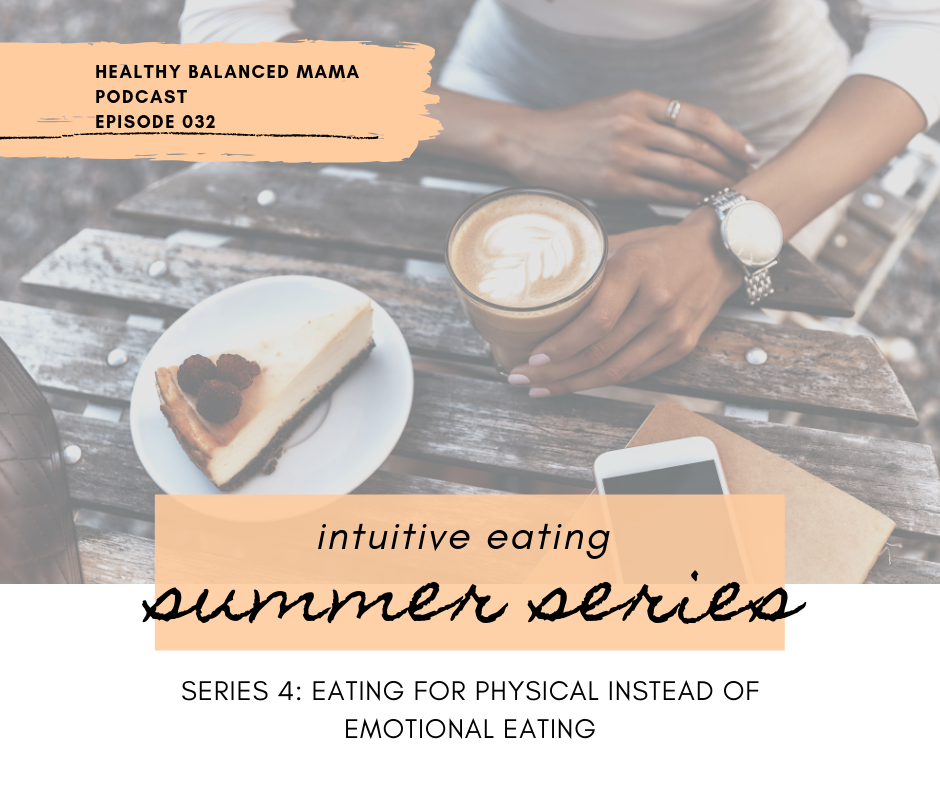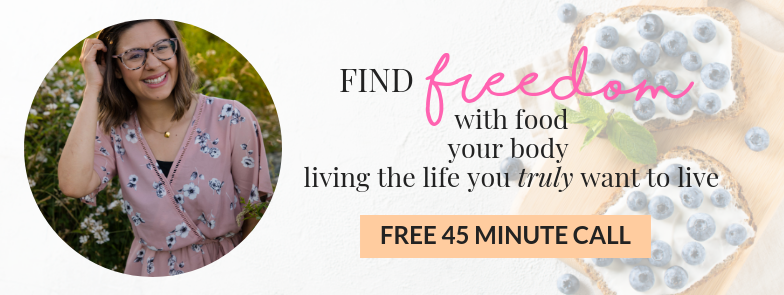
Today I am digging into Part 4 of my IE summer series. If you haven’t listened to part 1, all about ditching diets and making peace with food, part two, all about the satisfaction factor and the food police or part three, about hunger and fullness- I encourage you to go listen! My aim with this series is to give you short and sweet practical advice to begin to implement the ten principles of IE into your life.
Once you’re done listening to those, come right back, here. Today is a good one.
LISTEN: Listen on iTunes | Listen on Stitcher | Listen on Google Play | Listen on Spotify
SHOW NOTES
Just a reminder, for those of you who don’t know what IE is, intuitive eating is a self care nutrition framework developed by dietitians Elyse Resch and Evelyn Tribole, who has been my mentor in becoming an intuitive eating counselor, that is based on 10 principles, that has been verified by over 100 studies now to be effective in helping those that implement the principles become more in tune with their bodies, make peace with food, honor their hunger and fullness cues and nourish themselves without dieting. It’s not the hunger-and-fullness diet and it’s not a weight loss plan, but a framework to help you develop the skills to eat in a way that works for you.
To learn more about the 10 principles, check out Episode 004: The 10 Principles of IE.
Intuitive Eating Book:
Intuitive Eating: A Revolutionary Program that works by Evelyn Tribole and Elyse Resch© 2012 St. Martin’s Griffin; Third edition
In today’s episode we are digging into principle 7: eating for physical, rather than emotional reasons.
For more on stress eating, listen to episode 23.
We all experience emotions like stress and anxiety, anger, loneliness and boredom, and each one has it’s own set of triggers for what makes us tick, and we all have ways to cope with these feelings, both healthy and unhealthy. If you’ve ever experienced these emotions and felt like you used food to cope with them, this episode is for you.
Food is an easy fix. We all need it. Most of us enjoy it, and it’s readily available and accepted unlike drugs or even alcohol, or any of the other unhealthy coping mechanisms we might use to drone out our feelings.
If you’ve ever said- or heard someone say, along the lines of, “Ugh, I just need a brownie right now. That will make me feel better.” THAT is turning to food to cope.
The real question is, do you, though? I mean, you might WANT the brownie, and that’s perfectly fine– but if the brownie is a stand-in for dealing with your emotions, that’s where we tend to go astray.
When we are consistently using food as pleasure, without regard to physical sensations of hunger and fullness, or nourishment, that’s when food becomes a problem.
When we are consistently using food as pleasure, without regard to physical sensations of hunger and fullness, or nourishment, that’s when food becomes a problem.
And it’s not that food is the problem at all– it’s simply not the fix.
It’s normal that food has emotional associations. We are emotional beings and God made food as one of life’s simple pleasures.
The IE book actually points out that food becomes emotional the first time a baby is led to the breast or bottle to quell his crying. I’d say that’s pretty emotional, right? There is nothing wrong with eating with emotion. And sometimes, we have experiences where food IS our only friend. It’s ok to recognize those experiences and thank food for being there for you. I know it might sound silly– and it’s not how we should always live, but food is filled with love and comfort, it can be rewarding and sometimes it IS the reward for a hard period of time. Recognizing this is important.
When we are consistently eating instead of feeling our emotions is where it can lose it’s true value.
What’s even harder is when eating itself stirs up emotions like guilt and shame: sometimes when we are still stuck in the diet cycle and dealing with something completely unrelated to food, we turn to food for self punishment, or because we would rather feel the guilt and shame of eating what we’re not ‘supposed to’ instead of dealing with our true feelings.
This is why working on the other principles of intuitive eating- especially ditching the diet mentality, making peace with food and allowing unconditional permission to eat are so important.
The more tuned in we are to our body, the easier it is to recognize when emotions are popping up that may or may not be related to the actual food itself.
I love the example the IE book uses for food guilt- When their clients say, “I feel guilty because I ate…” They ask- “Did you steal that food? Did you steal money to get that food?” Of course not, is usually the answer– it’s an easy way to see that guilt over our food choices is unnecessary, even if we made a choice that didn’t serve us. One choice will not sabotage our entire health, body or relationship with food.
Studies have actually shown that even if you feel immediate comfort from a food, the feelings of guilt and shame around eating that food wipe out the initial relief. It’s a fruitless cycle.
Becoming an IE means you choose gentleness over guilt, finding ways to cope outside of using food.
So let’s further define emotional eating and talk about ways you might be using food to cope.
Emotional eating is eating to cope with feelings in a variety of ways– NOT in response to biological hunger. This is an important distinction. Choosing what you want to eat when you’re hungry is not emotional eating.
So why do we eat emotionally? There’s stress or anxiety, like we talked about in Episode 23, looking for comfort from the stress of life; loneliness is another reason we might use to comfort but then there is also boredom and anger, which could also be reasons for turning to food.
Starting to dig in and notice patterns in our eating for emotional reasons is the first step to starting to tackle this aspect of Intuitive Eating.
How do we do it, practically?
So how do we practically begin the process of choosing food for physical, rather than emotional reasons?
Remember- the steps we have discussed are important, first: we’ve talked about the first five principles, making peace with food, identifying true hunger and choosing satisfying foods being incredibly important, in this case, so you can recognize when you’re not eating out of hunger, or you’re seeking satisfaction because you don’t allow satisfaction otherwise– often times because you haven’t yet made peace with food.
1. Identify why you’re using food to cope. There are different levels of emotional eating, from sensory gratification all the way down to comfort. Identifying WHY you’re using food to cope is important. What do you want out of the food? Comfort? Satisfaction? Distraction? Are you punishing bad behavior with eating food you deem bad?
2. Identify what you’re using food to cope with. This is often not as clear cut as why you’re using food to cope. This might require digging deep– and if it is a consistent, deep seated habit, it might very well be worthwhile talking to a professional to get to the root of what you’re going through.
Notice emotional triggers that cause eating outside of hunger, like boredom, procrastination, or specific life events, like getting into a fight with your spouse, having a hard day with the kids or an exhausting day at work.
3. Begin to ask yourself questions when you are feeling the desire to eat.
Am I biologically hungry? What am I feeling and most importantly– What do I need? When we determine these things, we can move forward in fulfilling our needs- outside of food.
Friends, I am so enjoying sharing this series with you. I truly hope you are enjoying digging deeper into this series with me. Please shoot me an email if you have follow-up questions, kris@healthymamakris.com. I am planning on doing a Q+A episode at the end of the series answering your questions and don’t forget to tag me on Instagram + Facebook @healthymamakris with the progress you’re making. Remember I’m always here for one-on-one intuitive eating and nutrition coaching. I only have a couple coaching spots left this month– so head to my website, healthymamakris.com to book a free 45-minute discovery session to decide if working together is the next step in your food freedom journey.
Find me: Instagram FacebookHealthy Mama Life Facebook Community
Leave a Reply Cancel reply
5-day series: how to get started with meal prep for easier meals
free email series
©️ 2025 Kristin Dovbniak for Healthy Mama Kris | Template by Maya Palmer Designs | Privacy Policy | Terms
